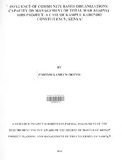| dc.description.abstract | This study examined the influence of community-based organizations' capacity on the management of Total War Against AIDS project in Kasipul Kabondo Constituency. A report by Joint United Nations Programme on HIV/AIDS established that some community based organizations were unable to translate increased funding possibilities to effectively and efficiently deliver and scale up HIV/AIDS programs (UNIADS & Accenture, 2007). As Kenya continues to operationalise Kenya National HIV I AIDS Strategic Plan (KNASP), there is need to address community-based organizations' capacity issues influencing the management of HI VIA IDS Projects. The purpose of the study was therefore to determine the influence of Community-Based Organizations capacity areas on the management of Total War Against AIDS Project in Kasipul Kabondo Constituency.
The objectives that aided the study were: to establish the influence of communitybased organizations' leadership capacity, human resource capacity, material capacity and financial capacity on the management of Total War Against AIDS project in Kasipul Kabondo Constituency. The findings ofthe study, were hoped would benefit the government of Kenya, the National AIDS Control Council, the community-based organizations and donors in enhancing the management of HIV I AIDS interventional projects.
In order to realise the objectives of this study the research explored the capacity areas of community-based organization such as leadership capacity, human resource capacity, material capacity and financial capacity as the independent variables influencing the dependant variable; management of Total War Against AIDS project. This study was grounded in the theory of empowerment. This theory postulates that community-based organizations (CBOs) are critical instruments for community mobilization and
transformation.
The study adopted descriptive survey design where qualitative and quantitative data was collected. The study population was 500 which consisted of community-based organization members, leaders and constituency AIDS control technical sub-committee members. A sample of 167 was drawn from the target population using simple random sampling and purposive sampling techniques. Data was analyzed using measures of central tendencies such as mean and mode using statistical package for social scientists (SPSS). Frequency tables and percentages were used to present the data.
The findings of the study revealed that there was capacity gaps in community-based organization engaged in Total War Against AIDS (TOWA) project in Kasipul Kabondo Constituency. It was also concluded that the capacity gaps in the areas of leadership, human resource, materials and finance had impeded the successful management of Total War Against AIDS project in Kasipul Kabondo Constituency. In view of the findings it was recommended that government should create a functional framework for capacity building for community-based organizations undertaking TOW A projects. It was also recommended that further research be done on the actual implementation and impact of TOWA project. | en_US |

